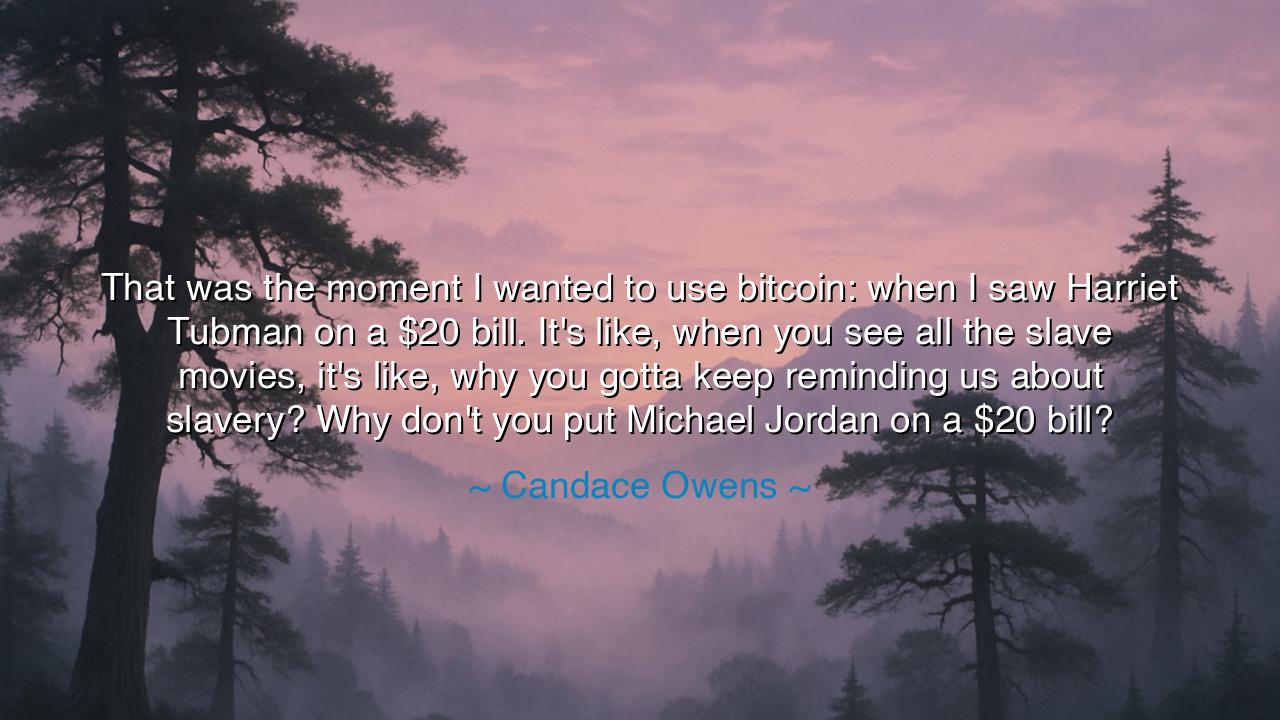
That was the moment I wanted to use bitcoin: when I saw Harriet
That was the moment I wanted to use bitcoin: when I saw Harriet Tubman on a $20 bill. It's like, when you see all the slave movies, it's like, why you gotta keep reminding us about slavery? Why don't you put Michael Jordan on a $20 bill?






Gather close, children, for the words of those who seek to understand the deeper currents of history and identity often carry truths that stir both the soul and the mind. Candace Owens, a voice often heard in discussions of race and history, once said: "That was the moment I wanted to use bitcoin: when I saw Harriet Tubman on a $20 bill. It's like, when you see all the slave movies, it's like, why you gotta keep reminding us about slavery? Why don't you put Michael Jordan on a $20 bill?" These words speak to a complex and deeply emotional truth about how we view history, identity, and legacy. It is a call to ask ourselves: What should we remember? What should we honor? And in the process, who decides what is worth celebrating and how it should be celebrated?
In the ancient world, the past was a sacred thing. The Greek philosophers like Plato and Aristotle believed that history was more than just a record of events; it was a reflection of values, virtue, and the soul of a people. The Romans, too, revered their past, and they understood that to honor one's ancestors was to honor the very foundation of who they were. But just as Plato urged his followers to question the accepted narratives, so too does Owens’ statement invite us to consider how history is remembered and by whom. The act of remembering can empower and heal, but it can also burden, especially when the past is repeated over and over, like a drumbeat that refuses to fade.
The story of Harriet Tubman is one of profound courage, resilience, and sacrifice. She freed herself from the chains of slavery and went on to guide many others to freedom through the Underground Railroad. Her life was filled with both suffering and victory, and she stands as a symbol of the fight for freedom. Yet, Owens’ frustration lies in how such figures are presented and the context in which they are remembered. To place Harriet Tubman on a $20 bill—an item of commerce, of modern America—may seem fitting to some, but to others, it is a reminder of a painful history that has yet to be fully acknowledged or healed. The past, though essential to our identity, can sometimes become a weight we carry, a chain that holds us back from embracing the future and celebrating the present.
In the same way that Owens questions the constant reminder of slavery through movies and currency, we must reflect on how we use symbols to remember the past. In ancient Greece, Herodotus, the "Father of History," recorded the rise and fall of nations, but his wisdom came from a deep understanding that history must be viewed through many lenses. What is remembered should serve to teach, not to wound. In the same vein, Owens’ call to replace Tubman with Michael Jordan is not a dismissal of Tubman’s importance, but rather an invitation to think about how we choose to celebrate achievements and progress. Jordan, as a figure of excellence, achievement, and modern-day influence, represents a different story, one that speaks to what has been accomplished, rather than only what has been endured.
Consider, children, the story of Rosa Parks, a woman who, like Tubman, became a symbol of resistance, but whose true legacy was rooted not just in the moment of defiance but in her quiet, consistent strength in the face of oppression. Her refusal to give up her seat on a bus did not just spark a movement—it sparked a change in the soul of a nation. However, as time passes, the pain of oppression often fades in favor of the more celebrated victories. It is easy to look back on her and say, "She changed the world," but how often do we reflect on the suffering that brought about that change? Owens’ reflection is not about dismissing these heroes but asking us to consider balance—to honor both the struggles and the successes of those who shaped our world.
The lesson here, children, is one of reflection—not just on what is remembered, but on how and why it is remembered. The past, like a shadow, follows us, and sometimes it serves to remind us of the mistakes we must never repeat. But it should also be a beacon of hope—a reminder of the victories that have been won, the strengths that have carried us through the darkest times, and the achievements that inspire us to move forward. Owens’ statement challenges us to question the stories we tell about who we are, and to decide, with clarity, how to balance honoring the past with embracing the future.
In your own lives, children, remember that history is not just a story of suffering; it is also a story of achievement. Do not let the weight of the past blind you to the opportunities of the present. Reflect on those who have come before you, but also honor the progress you can make, the new heroes you can create, and the legacy you can leave behind. Just as Owens asks us to embrace the legacies of figures like Jordan, you too should recognize the importance of living not just in the shadow of the past, but in the light of what you can create today. Celebrate both struggle and success, for in their balance, you will find the truest path forward.






AAdministratorAdministrator
Welcome, honored guests. Please leave a comment, we will respond soon